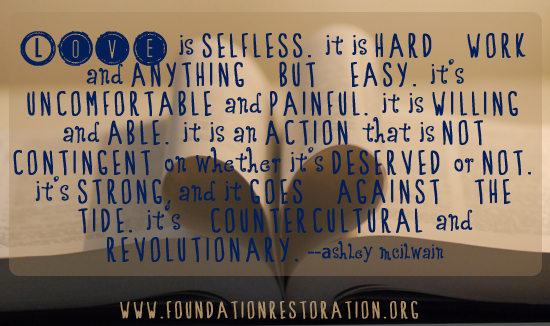By Ashley McIlwain
Love. What does that word even mean? These days it seems no one really knows anymore. When you ask someone what they believe love to be, oftentimes you get a description of euphoric, idyllic feelings that sound like a chapter out of a romance novel or a scene from the latest chick flick. The truth is, many of us do define love as a feeling, when in fact, that doesn’t even scratch the surface of what love really is or entails.
So, what is love? What does it look like? Where can we find it, and how can we display it? All good questions to ask and ponder.
There is one example of love that we can and should look toward for the answer to these questions, and that is the love of Christ.
If you’re like me, when I conjure up thoughts of Christ’s love, I picture healings, fellowship, gentleness, ministry, and somewhat of a feel-good representation. It’s a bit of a watered down and carefree approach to Jesus and His ministry. A lot of people talk about Christian love in the context of just going with the flow, not rocking the boat, and just accepting everything and everyone as is. We like Christ’s love to fit into our comfort zone – minimal effort and minimal work! But we’re missing out on the complete picture.
The love of Christ is gruesome. It was anything but easy, and it was anything but comfortable. Jesus totally rocked the boat, and He changed the world forever. His love went beyond any other possible act of love that had been witnessed or would ever be witnessed again. It pushed the boundaries and went above and beyond expectations. It defied all logic and reason. It is incomprehensible and thrashes our comfort zone. Christ’s example of love can be summed up at the cross.
Brutally beaten, flesh torn, a crown of thorns puncturing his head, mocked, ridiculed, and betrayed. Nails hammered through the skin, bones, and muscles in His hands and feet where He would hang outstretched on a wooden cross. We cannot even begin to comprehend the immeasurable amount of suffering physically and spiritually that Christ endured that day. Words could never begin to express or capture the depth of agony He must have felt as He took on all of the evil and sin of the world. And He did it all for us. To give us freedom, eternal life, reconciliation, forgiveness, and hope. He died even for the very ones who annihilated His precious body. He became the ultimate sacrifice for us all in the greatest act of love ever known.
In his book Radical, Pastor David Platt describes it this way, “The just and loving Creator of the universe had looked upon hopelessly sinful people and sent His son, God in the flesh, to bear His wrath against sin on the cross and to show His power over sin in the Resurrection so that all who trust in Him will be reconciled to God forever.” Romans 5:8 says, “But God demonstrates His own love for us in this: While we were still sinners, Christ died for us.” Can you even comprehend dying for the one you love let alone your enemies?! If I’m being honest, that’s a very hard concept to grasp, but that is the perfect love of God.
So, what can we practically take away from this? How can we apply this to our lives, our marriage?
Love is selfless. It is hard work and anything but easy. It’s uncomfortable and painful. It is willing and able. It is an action that is not contingent on whether it’s deserved or not. It’s strong, and it goes against the tide. It’s counter-cultural and revolutionary.

We are constantly told that love is a feeling. That we deserve to be happy. That if we aren’t happy, satisfied, or enthralled, that we deserve better. Most of us believe marriage is about me, me, me. What can I get out of it? What’s in it for me? It’s a self-serving vending machine that gets kicked to the curb if it doesn’t spit out what we want when we want it. Christ teaches us that love is anything but this selfish, emotional high we chase after.
It’s interesting that in one of the most famous passages of the Bible on love, 1 Corinthians 13: 4-8, it starts out with love is. The dictionary defines “is” as an essential attribute of something. So all sixteen identifiers of love that follow “Love is” are essential attributes, all of which describe how to love. That indicates that love is something we do for someone else. It’s selfless and other-oriented.
We think love is deserved or something earned. “I will love my spouse if _____.” When we say, “I do” to our spouse before God, friends, and family, we are committing to love like Christ, which means if is no longer relevant. Love is. Regardless of emotions, feelings, deserved or undeserved, love is a choice to put aside our selfish nature and choose to love.
This isn’t always easy, and it’s certainly contrary to our natural inclinations and desires. That’s why we need to call upon the Lord in those moments when we can’t get beyond how we feel. When our grace has run out, and we just don’t want to love our spouse anymore, we can reach out to God to help us do the seemingly impossible. In 2 Corinthians 12:9 it says, “My grace is sufficient for you, for my power is made perfect in weakness.” We weren’t meant to do it all on our own; God is with us.
While we may be bombarded with messages that love is just a feeling, that’s not the truth. Love is much more than fickle, temporary, selfish pursuits. Christ demonstrated true love to us when He went to the cross to bear the wrath of God that we deserved for our sins. He poured out love that day to reconcile us to God and give us hope and a future. He did this when we least deserved it because that’s how much He loved us.
When you’re struggling in your marriage, when the world tells you to give up, when you want to chase after happy, emotional highs, remember the love of Christ. Remember that the best love there is is a selfless, gracious love that is poured out when it’s least deserved. That’s what make true love so special and set apart – it’s unchanging, relentless, and intentional regardless of circumstances.
Copyright © 2013, Foundation Restoration. ALL RIGHTS RESERVED. No reproduction allowed without written permission from Foundation Restoration and/or the author.







AMEN! I am sick of watering down and playing it safe. It’s not that I want to rock the boat, but it is unavoidable if we are truly following the Jesus of the Bible! I just read Radical and am changed because of it. We must be about the Lord’s business!